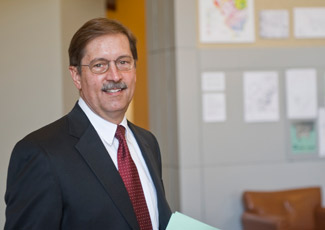
“I came here because the kinesiology department is very dynamic. There are invigorating faculty members to work with.”
April 26, 2013
History, commitment to students intersect for Bill Vogler
The commitment of the SIU faculty and staff to our students, our communities, and our University runs deep. They are proud to add to the legacy of those who helped transform SIU into the world-class institution that it is today.
Many of our buildings bear their names. For Bill Vogler, those names are more than institutional memories; they are part of his personal history.
Bill – whose grandfather opened Vogler Motor Co. in 1923 – came home two years ago as a professor and chairman of our kinesiology department. His extensive background includes teaching, research and leadership roles at Illinois State University, the University of Colorado, Arizona State and SIU Edwardsville.
“I grew up in the neighborhood with some of the faculty whose buildings have their names – Neckers, Faner, I grew up with the Shryock kids, the Wham kids. Ed Shea was my mentor. This place means more to me than any other institution I’ve been at because I grew up on the campus. I have a shared history with people here for the past 50 years that is aligned with the university and the community.”
Delyte Morris, SIU’s president from 1948 until 1970, gave the Voglers one of their family dogs. Morris’ son, Mike, was Bill’s camp counselor during summer camp at Touch of Nature. Today, Bill serves on the Friends of Touch of Nature Board.
“SIU grew from a sleepy teachers college to a major university while I was here,” he says.
But Bill did not return because of those wonderful memories.
“I came here because the kinesiology department is very dynamic. There are invigorating faculty members to work with.”
Kinesiology, which is the study of human movement, is one of the fastest-growing majors in the country because our culture has embraced sports, physical activity, fitness, wellness and health.
“A whole host of professions has grown up around that, and there is a lot more science and scholarship that has grown up around that,” Bill says. “In the old days, we were physical education teachers and coaches. We still have a great physical education program, but we are much broader than that.”
He calls kinesiology, which is very science-oriented, a “value-added” major. Fifteen years ago, 5 percent of students with a kinesiology degree went into allied health fields, medical school, physical and occupational therapy, and athletic training. Today, that has grown to above 30 percent.
“In our major, we have bio-mechanics, motor behavior; we study the physiology of human movement and exercise, which is unique across the campus. We are all about the human system.”
Kinesiology’s popularity here mirrors the national trend. For example, the new major of sport administration has grown to an enrollment of 145 students in just four years. Exercise science is adding 10 to 20 students each year.
“We are growing, and that is a good marker of the popularity of our programs and how our culture has embraced kinesiology,” Bill says.
Kinesiology is housed in Dorothy R. Davies Hall, named for the woman who chaired women’s physical education from 1939 to 1974. I am sure her legacy inspires Bill and the faculty as they inspire the students of today.
